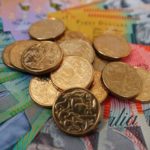Australian dollar was trading steadily against the US counterpart on Friday, poised for the largest weekly gain in a month, following the release of a series of crucial economic data out of China, while expectations appeared that the Federal Reserve Bank may probably delay the reduction of scale of its monetary stimulus.
AUD/USD touched a session high at 0.9646 at 6:25 GMT, after which consolidation followed at 0.9638, gaining 0.05% for the day. Support was likely to be received at October 14th low, 0.9435, while resistance was to be met at October 17th high, 0.9647.
Australian dollar advanced to its highest level in four months against the greenback on Thursday, after Federal Reserve Bank of Chicago President Charles Evans, a voting member of the Federal Open Market Committee this year, said that the central bank should put off paring back of stimulus, because of disruptions in economic data caused by the partial US government shutdown that ended just yesterday. “Only the data can tell us how much progress we’ve made and they aren’t saying much right now,” Evans said yesterday in a speech prepared for delivery in Madison, Wisconsin, cited by Bloomberg.
Earlier on Friday, the National Bureau of Statistics of China reported that nations annual Gross Domestic Product rose 7.8% in the third quarter, marking the largest rate of growth this year, and also came in consonance with expectations, following the 7.5% increase in Q2. According to data, the indicator, gauging nations overall economic activity, was poised to reach and even exceed Chinese governments growth objective of 7.5% during the whole year. However, other reports, released by non-governmental institutions in the country, suggested that economy might decelerate its rate of growth.
Chinese industrial production increased 10.2% in September, after the 10.4% advance in August, while experts projections were slightly exceeded, as they pointed a 10.1% increase.
Also, Chinas retail sales rose 13.3% in the month of September, after a 13.4% gain during the preceding month. Preliminary estimates showed that sales will increase 13.5% in September. All these data points were vital for the Aussie, as China is Australias largest export partner.
Additionally, the yield on Australian three-year government notes dropped two basis points, or 0.02 percentage point, to reach 3.05%, after yields climbed to 3.21% on October 16th, marking their highest level since April 2012.
Meanwhile, in the United States, yesterday a weekly report said that the number of people who filed for unemployment assistance in the country decreased by 15 000 to 358 000 during the week ending on October 12th 2013, as the result was still influenced by delayed processing of data in California. Experts had anticipated that the number of claims will decrease to 335 000 from the revised down 373 000 claims in the preceding week.
A separate report showed that the Philadelphia Fed manufacturing index decreased to a reading of 19.8 in October from 22.3 in September, but however, the index surpassed expectations of a value of 15.0.
Elsewhere, the Aussie was lower against the euro, with EUR/AUD cross gaining 0.08% on a daily basis to trade at 1.4208 at 7:02 GMT. AUD/NZD pair was up 0.11% to trade at 1.1373 at 7:03 GMT.





